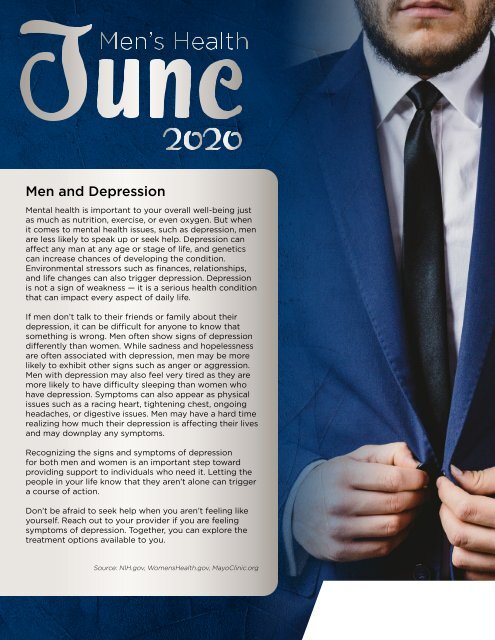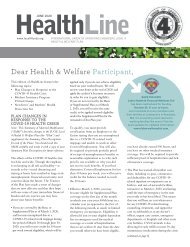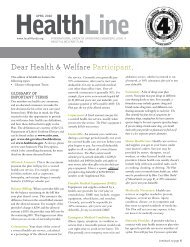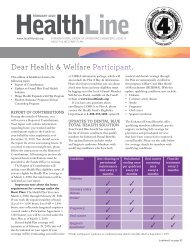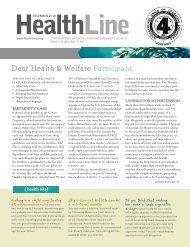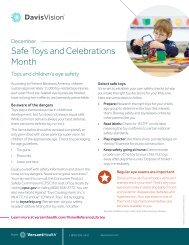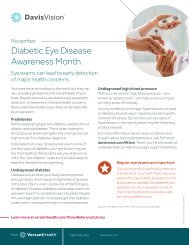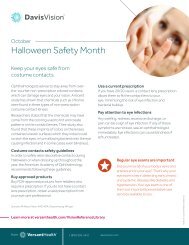Create successful ePaper yourself
Turn your PDF publications into a flip-book with our unique Google optimized e-Paper software.
Men and Depression<br />
Mental health is important to your overall well-being just<br />
as much as nutrition, exercise, or even oxygen. But when<br />
it comes to mental health issues, such as depression, men<br />
are less likely to speak up or seek help. Depression can<br />
affect any man at any age or stage of life, and genetics<br />
can increase chances of developing the condition.<br />
Environmental stressors such as finances, relationships,<br />
and life changes can also trigger depression. Depression<br />
is not a sign of weakness — it is a serious health condition<br />
that can impact every aspect of daily life.<br />
If men don’t talk to their friends or family about their<br />
depression, it can be difficult for anyone to know that<br />
something is wrong. Men often show signs of depression<br />
differently than women. While sadness and hopelessness<br />
are often associated with depression, men may be more<br />
likely to exhibit other signs such as anger or aggression.<br />
Men with depression may also feel very tired as they are<br />
more likely to have difficulty sleeping than women who<br />
have depression. Symptoms can also appear as physical<br />
issues such as a racing heart, tightening chest, ongoing<br />
headaches, or digestive issues. Men may have a hard time<br />
realizing how much their depression is affecting their lives<br />
and may downplay any symptoms.<br />
Recognizing the signs and symptoms of depression<br />
for both men and women is an important step toward<br />
providing support to individuals who need it. Letting the<br />
people in your life know that they aren’t alone can trigger<br />
a course of action.<br />
Don’t be afraid to seek help when you aren’t feeling like<br />
yourself. Reach out to your provider if you are feeling<br />
symptoms of depression. Together, you can explore the<br />
treatment options available to you.<br />
Source: NIH.gov, WomensHealth.gov, MayoClinic.org
Getting ready to ask<br />
How to ask a friend if they’re OK<br />
Ask yourself:<br />
Am I ready?<br />
Am I in a good headspace?<br />
Am I willing to genuinely listen?<br />
Can I give as much time as<br />
needed?<br />
Am I prepared?<br />
Do I understand that if I ask how<br />
someone’s doing, the answer<br />
could be: “I’m not doing well.”?<br />
Do I understand that I can’t ‘fix’<br />
someone’s problems?<br />
Do I accept that they might not<br />
be ready to talk?<br />
Have I picked my moment?<br />
Have I chosen somewhere<br />
relatively private and comfy?<br />
Have I figured out a time that will<br />
be good for them to chat?<br />
Have I made sure I have enough<br />
time to chat properly?<br />
Having the chat<br />
• Pick the right place — make sure it is quiet and secluded<br />
• Remove distractions before you start<br />
• Don’t push — if they say they don’t want to talk, let them know you’re here if they change their mind<br />
Starting the conversation<br />
• “Hey, how have you been lately? What’s been happening?”<br />
• “You haven’t seemed like yourself lately. Would you like to talk?”<br />
• “How are you doing? Anything you want to chat about?”<br />
How to respond<br />
• Be a good listener by paying attention and asking questions<br />
• Don’t try to solve the problem for them<br />
• Ask them why they may be feeling that way<br />
• Let them know you’re here for them<br />
• Don’t judge what they say, even if you don’t agree with them<br />
If they say they’re not OK<br />
• Ask them what’s going on, listen, and acknowledge their feelings<br />
• Ask what they think will help them feel better<br />
• If you feel like they need more support, ask them if they have considered talking to a mental health professional<br />
• If you’re worried about their safety, let someone know<br />
Source: NIH.gov, WomensHealth.gov, MayoClinic.org<br />
To find local mental health resources during the COVID-19 crisis, click here.<br />
Learn how you can come to terms with your depression by reading this article.<br />
Click here to learn about healthy choices that can boost your happiness.


